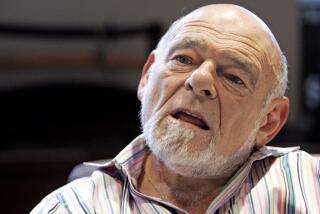Siebel Zooms to Pinnacle of Customer Service Software
SAN FRANCISCO — Lots of companies are dedicated to customer service, but not many businesses dedicate conference rooms to their customers as Siebel Systems Inc. does.
Customer names like IBM, Charles Schwab and Andersen Consulting adorn the rooms where Siebel plots its strategy to remind employees about the company’s crusade.
Customer service isn’t just good business at Siebel Systems; it is the entire business. San Mateo-based Siebel has emerged as a Silicon Valley leader by developing and selling computer software that helps companies cater to their customers.
“We are fanatical about customer satisfaction,” said company founder and CEO Tom Siebel during a recent interview from his Montana ranch.
“Everything we do is built around keeping the customer satisfied.”
Siebel Systems makes software for a niche known as customer relationship management, or CRM. The software helps businesses market products, track sales trends and handle customer inquiries.
The company’s success has helped keep shareholders extremely satisfied. The company’s stock has risen 74-fold since its initial public offering four years ago. In the last year alone, the stock has enjoyed a fivefold increase, making Tom Siebel one of the world’s wealthiest men, with company stock worth $4.8 billion.
Siebel, 47, who started the company in 1993, insists that the riches mean little to him.
“The stock market could close for the next five years, and it wouldn’t matter to me,” he said. “I am more interested in building a company that people can be proud of. Making a lot of noise is easy to do. Making products that people want to use isn’t so easy.”
He is indeed building the company. Siebel Systems earned $122 million on revenue of $791 million in 1999, when Fortune magazine recognized it as the country’s fastest-growing company.
And last week, the company reported a second-quarter profit of $45 million, up from $24 million in the same period of 1999, while revenue more than doubled to $387 million.
“This is a company that has already exceeded everyone’s best hopes,” said Bob Austrian, a software analyst for Banc of America Securities in San Francisco. “Now, there is an opportunity to build a precedent-setting software company.”
As hot as the CRM software market has been in recent years, it is expected to get even hotter as companies demand more sophisticated computer tools to monitor their customers’ likes and dislikes. The research firm International Data Corp. predicts businesses will spend $17 billion on CRM software from now until 2003.
Tom Siebel appears confident that his company will capture most of the business. In the next year, he anticipates doubling the company’s 5,000-member work force to handle the projected growth.
But not everyone is convinced that Siebel Inc. will maintain its market leadership.
“Siebel is really cranking now, but that doesn’t mean they are without challenges,” said Steve Bonadio, who follows CRM software for the Meta Group in Westborough, Mass.
The key to success, analysts said, will lie in the development of more versatile CRM software that can analyze customers’ buying habits and navigate buyers through e-commerce transactions.
Bonadio says he believes that another San Mateo software company, Epiphany Inc., has a head start in analytical products and cites Redwood City-based BroadVision as another up-and-comer in the CRM niche.
But Siebel’s biggest threat may come from Oracle Corp., the world’s second-biggest software company, behind Microsoft. Oracle has made CRM software one of its top priorities and says it ranks second in the niche behind Siebel after several quarters of rapid growth.
In its last fiscal quarter, which ended May 31, Oracle said it sold $113 million of CRM software, up 161% from the same time in the prior year.
“The processes that [Siebel] automates aren’t going to be interesting to e-businesses in the future,” predicted Mark Barrenechea, Oracle’s senior vice president of CRM. “We should overtake Siebel in the next nine to 12 months. Every software company we have ever focused on we have beat. And we are focused on Siebel now.”
Siebel, who worked at Oracle for seven years, says he isn’t worried. He branded Oracle’s CRM numbers as “bogus” statistics that disguise a company weakness in the specialty.
“Oracle is largely irrelevant in this field,” Siebel said. “Once they bring a viable product to the market, we will start worrying about them.”
Siebel worked closely with Oracle CEO Larry Ellison until leaving in 1990 to run another software company, Gain Technology. Gain was sold to another old Oracle foe--Sybase Inc.--just before Siebel started his own company in 1993.
Since they parted, Siebel and Ellison have frequently traded barbs in the news media. But Siebel said reports of a feud between the two billionaires are overblown.
“If we were to run into each other at a cocktail party, we probably would end up sitting down together and talking for 45 minutes,” he said.
Like Ellison, Siebel has proved to be a ruthless competitor. His hard-driving company drove two of its early CRM rivals, Clarify and Vantive, into the arms of larger companies last year. Clarify, the former No. 2 CRM company, was sold to Nortel Networks and Vantive, formerly No. 3 in CRM, went to PeopleSoft Inc.
When he founded the company, Siebel thought his idea of tailoring software for customer sales and service would be warmly received. But he never envisioned the overwhelming demand that emerged after browser technology turned the Internet into a business Mecca.
“I think we have executed pretty well,” Siebel said, “but let’s call a spade a spade: We got lucky. We were in the right place at the right time.”
More to Read
Inside the business of entertainment
The Wide Shot brings you news, analysis and insights on everything from streaming wars to production — and what it all means for the future.
You may occasionally receive promotional content from the Los Angeles Times.










